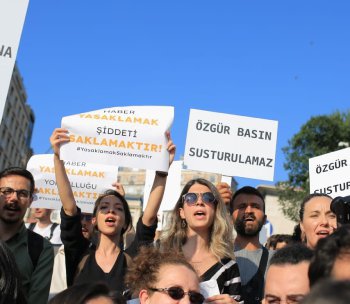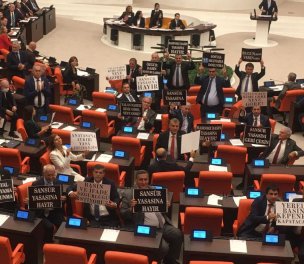Click to read the article in Turkish
bianet has interviewed nine journalists from the western Aegean Region of Turkey on their reactions to the newly adopted law named a 'disinformation law' by the government but dubbed as a "censorship law" by the critics. What they all said in common was: "We are not afraid, we will continue to write."
Ezgi Yıldız thought that local press and internet news portals would take a major blow with the "censorship law" and that there would be some who had to leave the profession and unemployment among journalists. But she also said: "I will continue practicing my profession until the end. I will not leave my country."
CLICK - Türkiye's new 'disinformation law' explained
Journalist Tugay Can told bianet that internet news portals were new in Turkey as in the world and a regulation was needed but that the new law was nothing but the stubbornness of the government in saying "I will be controlling the truth also."
Can emphasized that the new law was not only limiting even more the already narrow space for the journalists, but also threatening the freedom of expression of all citizens.
He said, "I find this quite dangerous and wrong for a country like Turkey which cannot solve its problems since the society is not able to talk about the problems."
Dilek Omaklılar, a correspondent of Evrensel daily said that the one-man regime did not target disinformation or those who disinformed the public, but the journalists, the scientists reflecting the truth, reporting the poverty, the fraud, and the workers, the laborers posting their demands and protests on social media, who take action for their most basic rights.
"A moral responsibility"
Tolga Güney, a reporter for the Mezopotamya Agency, explained how the new censorship law would function, giving an example from cases of ecological destruction in Turkey.
"For instance you have close relations with the government and you wish to completely destroy Eşkencedere, which was identified by UNESCO as one of the 353 valleys in the world which should definitely be protected. So no citizen or journalist will be able to report on this, since the act is legal according to the government."
Güney said that they would continue doing their job no matter what penalty was given to them and that the facts could not be kept hidden in a world where the ecological system was now under threat, and that this was a moral and occupational responsibility.
İzel Sezer, the chief editor of İleri Haber, told bianet that the purpose of the new law adopted with the votes of the MP's supporting the government in laughter was to block people's right to receive and also to give information.
Sezer said, "Those who vote in the parliament by instructions and who believe that they can criminalize journalism and that they can silence the journalists or the people should know: If necessary we will communicate through smoke signals but we will continue to search for the truth, we will continue to report the crimes against people and write about each one of them."
"Post-truth"
bianet has also spoken to journalist Osman Çaklı who said that we were actually practicing the facts being replaced with lies in a post-truth period.
He said, "Since the workers turned the walls into newspapers in the period after the industrial revolution, attempts to limit or to ban freedom of expression were not successful in overcoming the truth... We will continue to write, to tell and to keep record."
Jin News correspondent Melike Aydın told bianet that if there was pressure on press somewhere, there would also be great crimes against people there. She said: "Those who are telling the truth are on target, but in fact it is the people who are on target."
Elections
Etkin Kolbaşı, representative of Sol TV said, "Türkiye will be entering an election atmosphere . This law will be very instrumental for the government in the election period."
Kolbaşı said that the journalists would know how to overcome the difficulties the new law will bring, struggling together and standing by one another in solidarity.
Journalists also made a press statement in Tiritoğlu square in the western city of Uşak against the newly adopted law stating that the newly adopted censorship regulations would not stop them from fulfilling their duty.
About the lawAccording to the "Draft Bill on the Amendment of the Press Law and Some Laws," those who work for internet news portals will be regarded as journalists and they will be able to apply to the Department of Communication for a press credential. Public employees working in information services in public institutions, radios and televisions will also be able to receive press credentials. Internet news portals will be taken within the scope of periodical publications. The proposal reads, "Those who publicly distribute information which is not really related with the security of the country inside or outside, public order or public health with the purpose of creating concern, fear or panic among the people in a manner that domestic peace" may be destroyed will be punished with an imprisonment sentence of 1 to 3 years. With the proposal, reporting offensive content related to the National Intelligence Agency activities and personnel is included within the scope of catalog crimes. |
(ÖK/PE/VK)





.jpg)



sa.jpg)
